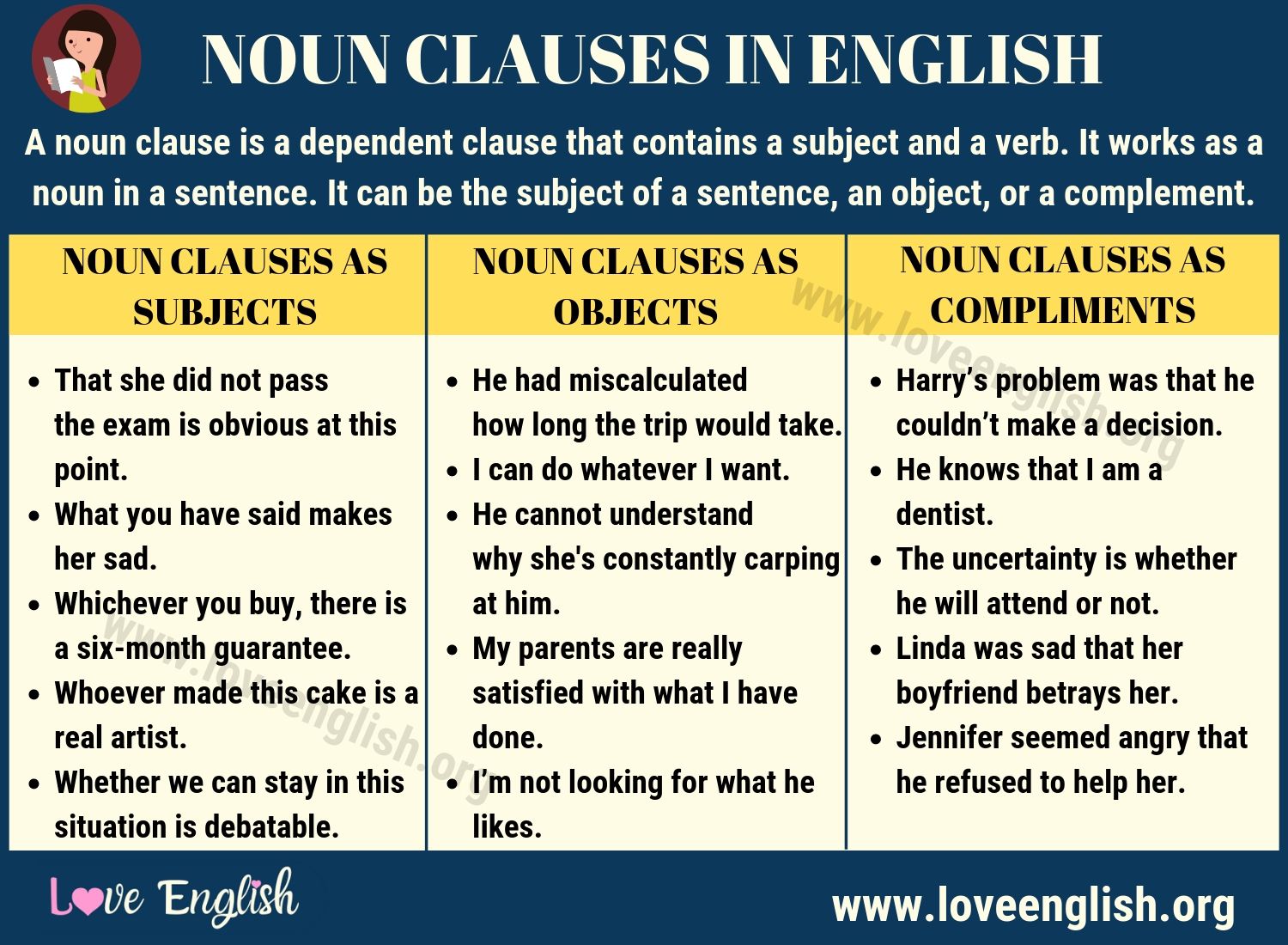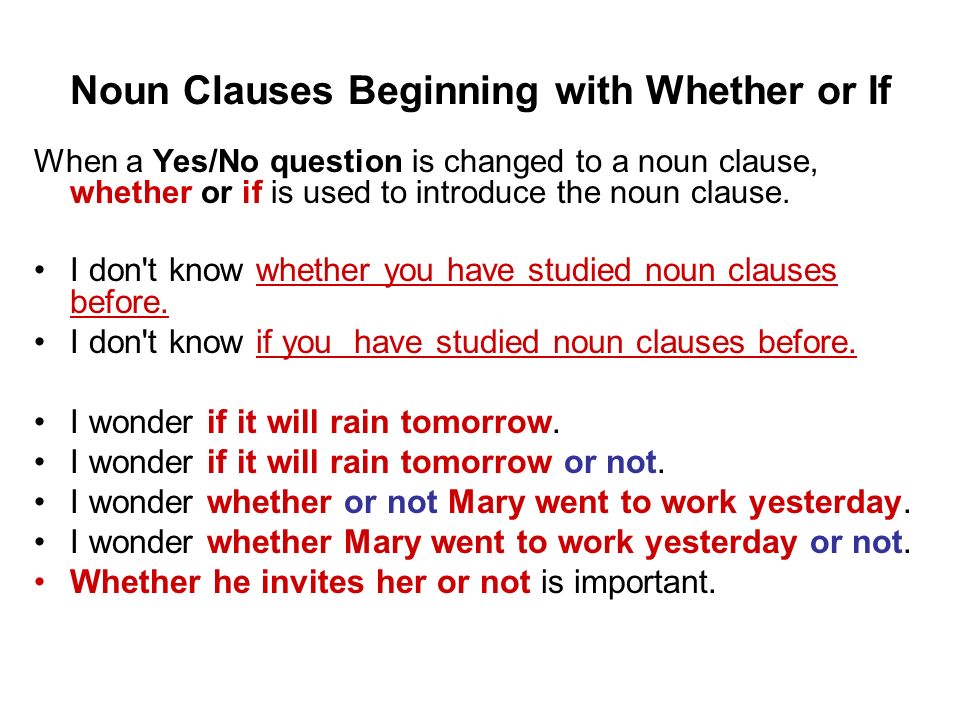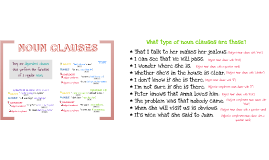What Is A Noun Clause - Noun Clauses _ A noun clause is a dependent clause that acts as a noun.
What Is A Noun Clause - Noun Clauses _ A noun clause is a dependent clause that acts as a noun.. What does noun clause mean? A noun clause is a clause (containing a subject and a verb) that can replace a noun. A noun clause is a dependent clause that takes the place of any noun in the sentence, whether they are subjects, objects, or subject complements. Noun clauses can act as subjects, direct objects, indirect objects, predicate nominatives, or objects of a preposition. They function as adjectives, adverbs, and nouns using pronouns or subordinating conjunctions.
What is a noun clause? As such, it serves to name a person, place, or thing. Noun clauses generally begin with words such as how, that, what, whatever, when, where, whether, which, whichever, who, whoever, whom, whomever, and why. A noun clause is a group of words acting together as a noun. Examples and definition of a noun clause.

A noun clause is a dependent clause that acts as a noun.
Unlike noun phrases, noun clauses contain both a subject and a verb. That is, they do not form a complete sentence. Like all clauses, a noun clause contains a subject (sometimes. Noun clauses can act as subjects, direct objects, indirect objects, predicate nominatives, or objects of a preposition. In simple terms, a noun phrase is a dependent clause that replaces any noun in a sentence, whether it is subject, object, or subject compliments. For example (noun clauses shaded): What is a noun clause? A noun clause cannot stand alone as a sentence because it cannot express a complete thought. A noun clause can be used as a subject or a specific object of a verb, as a noun, as an adjective, or as an adverb. Noun clauses begin with words such as how, that, what, whatever, when, where, whether, which, whichever, who, whoever, whom, whomever, and why. A noun clause is a type of dependent clause that is able to function grammatically like a noun in a sentence. Take a look at some sample sentences containing noun clauses to understand their purpose and function. A noun clause has to do with the beta clause, which we also call a dependent or subordinate clause which performs the function of a noun in a sentence or functions like the nominal group.
Noun clause as the object of a verb. A noun is a part of speech that names a person, place, or thing. A noun clause has to do with the beta clause, which we also call a dependent or subordinate clause which performs the function of a noun in a sentence or functions like the nominal group. That place is impossible to find. A noun clause is a dependent (or subordinate clause) that works as a noun.

Some examples of nouns include, man, house, and car.
We'll explore them acting as subjects, direct objects, objects of the preposition, and predicate nouns. A noun clause is a dependent (or subordinate clause) that works as a noun. A noun clause cannot stand alone as a sentence because it cannot express a complete thought. Simply put, a noun clause is a dependent clause that takes the place of a noun in the sentence. It contains a subject and a verb but it does not express a complete thought and cannot stand alone as a complete sentence. A noun serves as the subject of the verb in a sentence or it serves as the complement of the verb in a sentence ; That place is impossible to find. It can be a subject, object, or complement. Noun clauses will contain a subject and a verb, but they cannot stand alone in a sentence. Replace a noun clause with a pronoun or a noun to check if it is actually a noun clause. Noun clauses generally begin with words such as how, that, what, whatever, when, where, whether, which, whichever, who, whoever, whom, whomever, and why. As a noun clause does the work of a noun, it can be subject to a sentence, object of a transitive verb, object of a preposition, apposition to a noun, or complement to a linking verb. It can be the subject of a sentence, an object, or a complement.
Noun clauses generally begin with words such as how, that, what, whatever, when, where, whether, which, whichever, who, whoever, whom, whomever, and why. A noun clause is a dependent clause that functions as a noun. An adjective clause is also known as a relative clause. Noun clauses can act as subjects, direct objects, indirect objects, predicate nominatives, or objects of a preposition. A noun clause is that contains a finite verb and functioning like a noun within a sentences.

I can understand that you won't be always with me.
These clauses are always dependent clauses. A noun clause is a group of words acting together as a noun. In simple terms, a noun phrase is a dependent clause that replaces any noun in a sentence, whether it is subject, object, or subject compliments. It follows a linking or copular verb to describe or modify the subject of the sentence. They function as adjectives, adverbs, and nouns using pronouns or subordinating conjunctions. It can be the subject or object of a verb. A noun clause is a clause that plays the role of a noun. She said that her friend's name was sam. We have also seen that a noun clause is a subordinate clause which does the work of a noun in a complex sentence. The noun clause from image.slidesharecdn.com a content clause, also known as a noun clause, provides content implied or commented upon by its main clause. Noun clauses perform the same functions of a noun. It can be the subject of a sentence, an object, or a complement. Noun clauses are subordinate clauses that act as nouns.